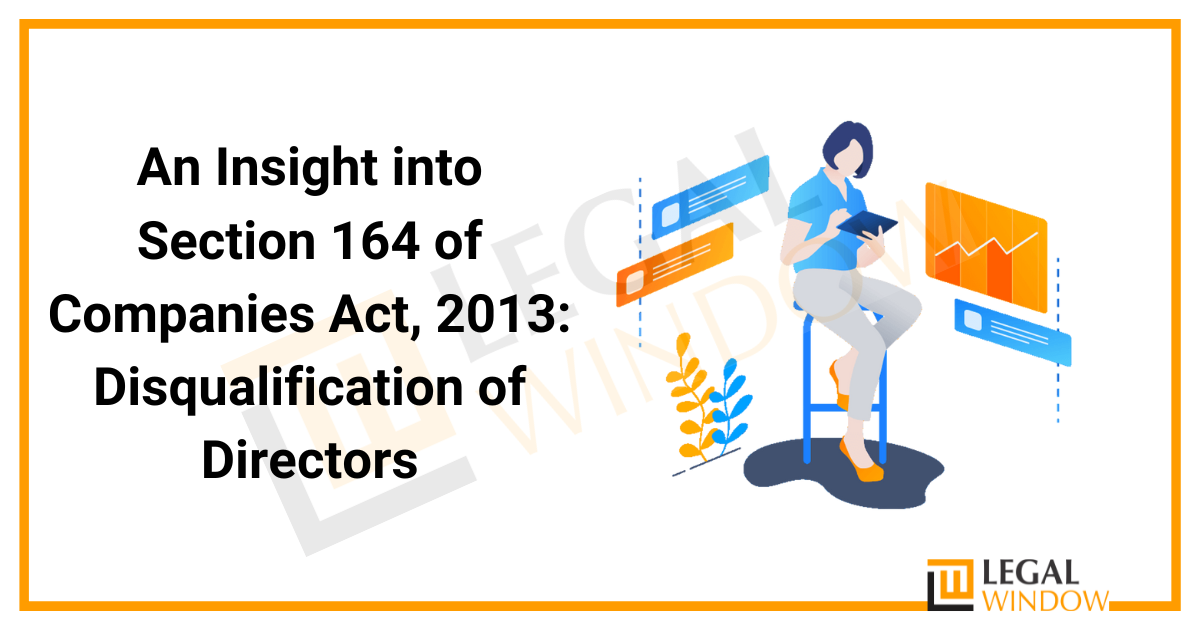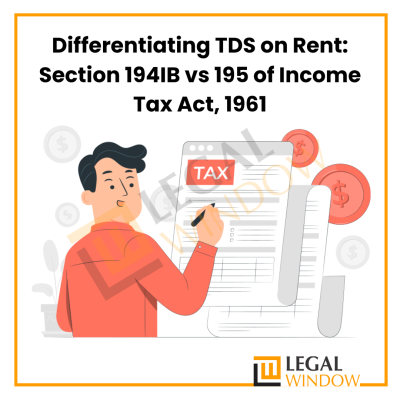An Insight into Section 164 of Companies Act, 2013: Disqualification of Directors
- June 21, 2023
- Company Law

Directors play a vital role in the corporate governance of companies, ensuring compliance with laws and regulations while safeguarding the interests of various stakeholders. The Companies Act, 2013, enacted in India, introduced several provisions to enhance transparency, accountability, and corporate responsibility. One such significant provision is Section 164 of Companies Act, which deals with the disqualification of directors.
Director disqualification is a way of restricting a person from becoming a director or setting conditions under which they cannot be appointed as an executive of a company. Disqualification from the office of a director of a company further means that he cannot be appointed as a director of any company within the period fixed/determined by the court or tribunal. In this article, we will discuss Section 164 of the Companies Act, 2013.
| Table of Contents |
What is Section 164 of the Companies Act, 2013?
Section 164 of the Companies Act, 2013, primarily focuses on the disqualification of directors in certain cases. It outlines the grounds on which a person may be disqualified from holding the position of director in any company. The section aims to uphold corporate integrity by preventing individuals involved in malpractices or non-compliance from continuing to serve as directors.
What does Section 164 of the Companies Act, 2013 specify?
Section 164 of the Companies Act, 2013 contains provisions for the disqualification of a director. Under the Companies Act, 2013, section 164 applies to the disqualification of directors of a company. Section 164(2) (a) states that an individual will face disqualification who has been a director of a corporation that has no financial statements or annual returns for 3 consecutive financial years.
Section 162(2) provides that no natural person who is or has been a director of a company that a) has not filed accounts or annual returns for any continuous period of 3 fiscal years may be re-appointed as a director of that company, corporation or a nominee in another corporation for 5 years from the date on which the said corporation fails to submit the necessary compliance documents.
The provisions of Section 164 (2) (a) of the Act deals with standards related to the disqualification of directors. The rule says that if the assessee company has not submitted the accounts or annual returns for any three consecutive years, the directors of the said company will be disqualified from office for 5 consecutive years.
Grounds for disqualification of Director
The reasons for the disqualification of the Director are-
- When the company does not pay interest on deposits or does not return the deposit received.
- If the organization fails to pay the required interest or repay the bonds by the due date.
- Failure to pay the declared dividend and continuing this activity for more than one year may result in the disqualification of the director of the company.
- If the director applied for a declaration of insolvency.
- If the director was previously disqualified by the court.
- Unless the board of directors discloses its or co-ownership interests in any company.
- If the director has been convicted of a criminal offense and sentenced by a court to imprisonment for more than 6 months.
- If the court determines that the director is mentally ill.
- If the director of the company is found guilty under section 188 of the Penal Code for party transactions carried out by the director in the previous five years.
- Directors who are still insolvent can be excluded by the court.
Consequences of Disqualification
Once disqualified, a person cannot be appointed or reappointed as a director in any company for five years from the date of disqualification. Additionally, any existing directorship held by the disqualified individual becomes vacant, and they are required to vacate their office.
Effects on the Company
The disqualification of directors can have significant repercussions for the company. It may impact the decision-making process and the ability of the company to carry out its operations smoothly. Disqualification can also tarnish the company’s reputation, leading to a loss of investor confidence, and potential legal consequences.
Remedies and Reinstatement
If a person wishes to challenge their disqualification, they have the option to file an appeal with the National Company Law Tribunal (NCLT) within a specified period. The NCLT has the authority to grant relief and reinstate the disqualified director if it deems fit.
Final words
Section 164 of the Companies Act, 2013, serves as a crucial provision in maintaining the integrity and accountability of corporate directors. By imposing disqualification on directors involved in non-compliance or malpractices, promotes responsible corporate behavior and protects the interests of stakeholders. Both directors and companies need to understand the implications of Section 164 and ensure compliance with its provisions to avoid disqualification and the associated consequences.
Neelansh Gupta is a dedicated Lawyer and professional having flair for reading & writing to keep himself updated with the latest economical developments. In a short span of 2 years as a professional he has worked on projects related to Drafting, IPR & Corporate laws which have given him diversity in work and a chance to blend his subject knowledge with its real time implementation, thus enhancing his skills.
Categories
- Agreement Drafting (23)
- Annual Compliance (11)
- Change in Business (36)
- Company Law (148)
- Compliance (90)
- Digital Banking (3)
- Drug License (3)
- FEMA (17)
- Finance Company (42)
- Foreign Taxation (6)
- FSSAI License/Registration (14)
- GST (120)
- Hallmark Registration (1)
- Income Tax (202)
- Latest News (34)
- Miscellaneous (165)
- NBFC Registration (8)
- NGO (14)
- SEBI Registration (6)
- Section 8 Company (7)
- Start and manage a business (21)
- Startup/ Registration (130)
- Trademark Registration/IPR (40)
Recent Posts
About us
LegalWindow.in is a professional technology driven platform of multidisciplined experts like CA/CS/Lawyers spanning with an aim to provide concrete solution to individuals, start-ups and other business organisation by maximising their growth at an affordable cost.








